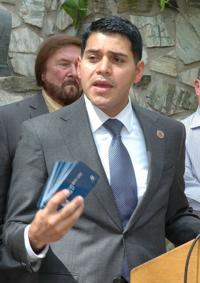PHOENIX — A prayer is only a prayer if it refers to God, at least according to the state House of Representatives.
And that means atheists such as Rep. Juan Mendez, D-Tempe, can’t give the official prayer that starts off every session.
That unofficial policy was adopted last month by House Majority Leader Steve Montenegro, R-Litchfield Park. So the prayer on Monday — the day Mendez wanted because the Secular Coalition of Arizona was at the Capitol — was instead offered by a minister who made repeated references to the Almighty as well as Jesus Christ.
But Mendez did an end run of sorts: He used his right to make personal comments to offer a secular invocation of his own after the official prayer, saying the diversity of Arizona includes people of different religions “and lack thereof.”
“We need not tomorrow’s promise of reward to do good deeds today,” Mendez said in his floor speech.
Until recently, it was the practice to rotate the prayer among House members. They could give the invocation themselves or select someone else.
So three years ago, when it was Mendez’s turn, he urged fellow lawmakers “not to bow your heads” as he talked about “this extraordinary experience of being alive.” That provoked an angry reaction from several of his colleagues.
This year, Mendez said he made a request on the first day of the session in January to give the prayer on Monday. Mendez was told that day was already spoken for.
Shortly thereafter, Montenegro put out a memo saying that the House rules that require the day start with a prayer requires something that specifically refers to a higher power.
“Prayer, as commonly understood and in the long-honored tradition of the Arizona House of Representatives, is a solemn request for guidance and help from God,” Montenegro wrote. He said anything else — including a moment of silence — does not meet that requirement.
Montenegro would not discuss his memo.
But press aide Stephanie Grisham said the policy is legal, saying the U.S. Supreme Court has concluded that prayer, by definition, requires a reference to a higher power.
Mendez acknowledged that prayer could be considered a supplication, asking for some outside force to intercede. But he insisted prayers need not refer to God, nor that those who pray need to believe.
“In a lot of my prayers I ask for us to have faith in our community, in humanity, in our constituents, in ourselves down here” at the Capitol, he said.
“I may not see the same higher power,” Mendez continued. But he conceded he is “calling for some kind of higher power.”
But House Speaker David Gowan, R-Sierra Vista, said he agrees that prayer should refer to God.
“I’m a Christian man and believe that prayer has to be of God,” he said.
“The Lord is near and dear to my heart,” Gowan continued. “So when I do my prayers, it’s to God.”
Montenegro’s memo on what is permissible prayer was written before the dust-up at the Phoenix City Council when the Satanic Temple put in for its turn to offer a prayer. When city legal staff told council members they could not legally exclude the group, the council voted to eliminate the prayer entirely.
The memo from Montenegro says no faith will be excluded or favored in considering requests to give the prayer. It also says the privilege of leading the prayer “must not be exploited to proselytize or advance any one, or to disparage any other, faith or belief.”




